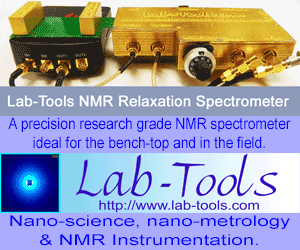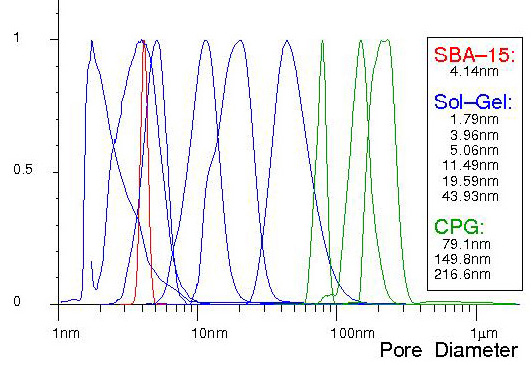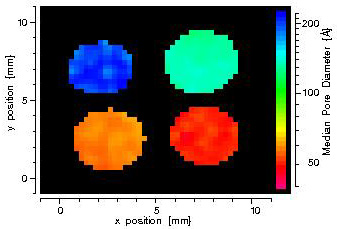Lab-Tools Ltd.
Nano- to Micro- Science & Metrology,
Scientific Instrumentation and Software.

Lab-Tools Ltd. Nano- to Micro- Science & Metrology,
|
 |
|
|
Lab-Tools Ltd. is a micro/SME spin-off company specialising in nano-science, nano-metrology and instrumentation design.
Highly compact precision MK4 NMR relaxation spectrometer
|
Lab-Tools performs NMR contract analyses, including both measurements of dynamics/mobility/rigidity using NMR relaxation, and of Pore Size Distributions using NMR Cryoporometry :Lab-Tools has successfully measured pore sizes in a wide range of porous materials, including oil and/or water wet materials. NMR Cryoporometry is one of the few techniques that can be applied to materials that can not be dried out without losing their structure. The technique is non-destructive, and can be used to follow evolution of pore structure for evolving systems.
The Lab-Tools pore-size distribution measurement
range extends from sub 1nm to over 1µm. NMR
Cryoporometry measures both the total pore
volume and the pore volume distribution as a
function of pore diameter.
NMR Cryoporometry measurement costs are very
competitive.
Cost per sample depends on the pore-size range to be covered, and
precision needed, but goes down markedly for
multiple-sample batches.
|
Academic Consultants :Prof John H. Strange:(NMR & porous media) : Emeritus Professor of Experimental Physics, School of Physical Sciences, University of Kent, CT2 7NZ. ~160 Publications
Prof J. C. Dore: |


|

|

|
Director Dr. Beau Webber
has held
has held positions at the University of Kent, honorary
and otherwise, for many years, and has held
research
fellow positions at Heriot-Watt University in Scotland, honorary and otherwise.
He has an extensive publication record in the fields of
nano-metrology and the
properties of liquids, ices and gas-hydrates in pores and
at interfaces :
www.lab-tools.com/publications/Webber_JBW.html
Grants :
Lab-Tools has won a 1.188
million Euro EU FP7 grant, in conjunction with
Agricultural Requisites And Mechanizations Limited,
Lightmain Company Limited,
Oxyguard International AS,
Technosam SRL,
The Nottingham Trent University and
Universitat Politecnica De Catalunya.
This project "Autonomous Reed Bed Installations (ARBI)"
will enable the consortium to develop ecologically sound
and sustainable modular reed-bed installations for
purifying waste-water.
Multiple nuclear magnetic resonance (NMR) installations,
buried in the reed-beds, will be used to monitor their
life-cycle, so that corrective action can be taken to
prevent clogging and extend their life.
Director Dr. Beau Webber has completed an academic project
using Lab-Tools' capabilities, together with the Centre
for Gas Hydrates Research at the Institute of Petroleum
Engineering, Heriot-Watt University, for three years, to a
value of £285,731. :
EPSRC: EP/D052556/1 : "Capillary
controls on gas hydrate growth and dissociation in
synthetic and natural porous media: PVT, NMR, Neutron
Diffraction and SANS".
Final Grant Report
Publications :
Director Dr. Beau Webber now has about 50 published papers, including two
techniques papers published in Physics Reports, one on
neutron scattering, one on NMR :
Nano-metrology of porous structures - I. Using neutron
scattering to access pore lattice, diameter and wall
parameters, by comparison with direct calculation of
scattering from models of extended arrays of regular or
randomised pores.
J.Beau W. Webber. Physics Reports, 526, 4, 227-248, 2013.
DOI: 10.1016/j.physrep.2013.01.002 .
The other Physics Reports paper was written jointly with
Kent and Cambridge Universities : Review
of NMR Cryoporometry, DOI: 10.1016/j.physrep.2008.02.001
.
We have developed and demonstrated the first practical
protocol for making 1, 2 and 3 dimensionally resolved
measurements of
volumetric metrology.
Lab-Tools performs contract measurements for a number of national and international companies including in the construction industry and oil / well-logging industries.
Our techniques are based on both physical thermodynamics and scattering techniques, and we can apply a range of NMR, X-ray and neutron scattering techniques, as well as the more conventional gas adsorption and thermoporosimetry techniques.
The strength of Lab-Tools in the nano- to micro-scale field is based on a strong record of academic research, combined with extensively applied metrology, and the proven ability to implement novel measurement protocols with appropriate combinations of apparatus, hardware, firmware and software.
Please do contact Dr. Beau Webber Lab-Tools Contact Form if you think these measurement techniques might complement your research studies.
|

|
|
|